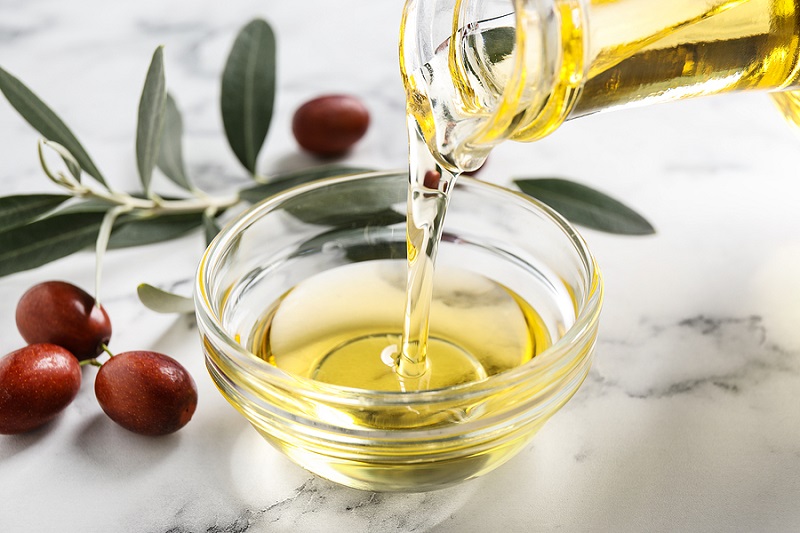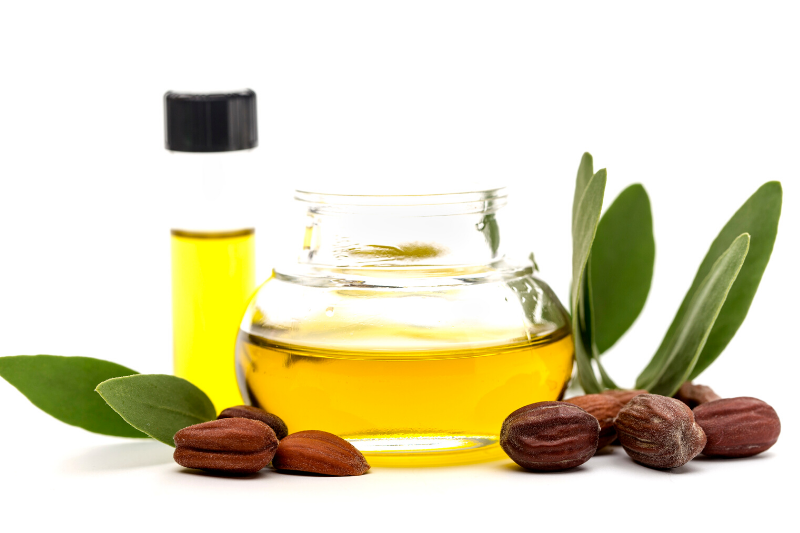So, nuts are your enemy. They cause awful allergic reactions when you touch or taste them, and you do everything you can to avoid them. But, you’ve also heard that jojoba oil can do wonderful things for your skin and hair, and you’re interested in trying it. You’ve also heard that jojoba is a nut, and so you’re thinking that you shouldn’t use it.
The good news is this – most things that we refer to as nuts are not actually nuts at all. Almonds? Not a nut. Walnuts? Not a nut. Peanuts? Not a nut. The same goes for jojoba – the plant does not produce a nut.
This doesn’t necessarily mean that you won’t be allergic to jojoba oil, though.
Keep reading for my full guide to what exactly jojoba and jojoba oil are including whether you are likely to have a jojoba allergy.
What Is Jojoba?
The jojoba shrub, or Simmondsia chinensis, is native to parts of Northern Mexico, Arizona, and California. On these shrubs, you can look for seeds that are about the size of an olive. Sometimes, these olive-sized seeds are referred to as “deer nuts”.
What Is Jojoba Oil?

Jojoba oil is what is produced when “oil” is extracted from the seeds. Technically, jojoba oil is not an oil at all — it’s a waxy ester. It is called an oil because, despite it being a waxy ester, it does have oil-like qualities.
About half of the seed is made up of this waxy oil, while the other half consists of fatty acids like palmitic acid, stearic acid, oleic acid, and arachidic acid. Not every one of these fatty acids will be found in every seed, though. The fatty acid content of the seeds will vary depending on the soil composition and the climate in which the shrub is growing.
Jojoba oil is well-loved by people throughout the world because of its amazing ability to moisturize both hair and skin. It is antibacterial, antifungal, anti-inflammatory, and is non-comedogenic, meaning that it does not clog pores.
Is Jojoba A Nut?
Is jojoba a tree nut? Is jojoba oil a nut at all? Is jojoba a nut allergy waiting to happen?
Many people mistakenly assume that if they are allergic to tree nuts that they can’t use jojoba oil. This is because, just as it is mistakenly referred to as an “oil”, it is also mistakenly referred to as a “nut”.
Jojoba plants do not produce nuts, rather, they produce seeds. However, many people refer to these seeds as a “deer nut”, a “goat nut”, or a “quinine nut”. This can lead to quite a bit of confusion.
What Is The Difference Between A Nut & A Seed?
Nuts and seeds are two completely different things. So, if you’re allergic to nuts, it doesn’t mean you’ll be allergic to seeds, or vice versa.
A seed is made out of three parts: an embryo, an endosperm for food storage, and a seat coat for protection.
Types of seeds include rice, wheat, beans, barley, peanuts, and of course, jojoba.
Nuts, on the other hand, are a type of fruit that produces seeds. They do not crack open after they’ve matured.
Examples of nuts include hazelnuts, chestnuts, and acorns.
For less confusion, I’ve created a chart to detail the differences of nuts and seeds:
| Nuts | Seeds |
| One-Seeded Fruit | Used For Propagation Of A Plant |
| A Nut Can Be A Seed | A Seed Can Not Be A Nut |
| The Shell Doesn’t Split At Maturity | The Shell Splits At Maturity |
| Nuts Are Not Attached To The Ovary | Seeds Are Attached To The Ovary Wall |
| The Nuts Can’t Be Separated From The Fruit | Plant Seeds Can Be Removed From Fruits |
| Nuts Have Vitamins, Proteins, Minerals, & Fats | Seeds Have Protein, Vitamin B, Fiber, Minerals, & Fats |
Can You Use Jojoba Oil If You Have A Nut Allergy?

Fortunately, jojoba oil and nut allergies are not related.
Although people sometimes refer to it as a jojoba “nut”, people with tree nut allergies do not usually need to worry. It seems that jojoba oil does not cause the same reaction in those allergic to tree nuts as would occur if you touched or ate a true tree nut. This is likely because jojoba oil is not really extracted from a true nut. It’s extracted from a seed.
In fact, most researchers agree that jojoba oil does not contain any allergens at all, so it is very unlikely that you would have a reaction to jojoba oil.
However, a reaction can still occur because — let’s face it — we as people can be allergic to anything. Still, allergic reactions that occur after the use of jojoba oil do not usually occur directly because of the jojoba oil itself.
Instead, allergic reactions usually occur because of impurities found in the product. This usually occurs with refined jojoba oil which includes other ingredients like mineral oils or alcohol. Those that use 100% pure unrefined jojoba oil are very unlikely to have an allergic reaction.
To prevent you from coming into contact with low-quality oil, many companies choose to refine their jojoba oil. While refined oil may be safer for your body to use, it is also less effective.
Refined jojoba oil is treated with heat and chemicals so that all the impurities are removed from the product. This means that most of the nutrients and vitamins are sucked from the oil as well. This leaves you with a white and odorless product.
Unrefined jojoba oil may contain some impurities that cause an allergic reaction, but it’s also much more likely to help your body. Unrefined jojoba oil retains all of its natural vitamins and nutrients.
What Causes An Allergic Reaction?
Allergic reactions occur because your immune system has an adverse reaction with whatever substance you have put into contact with your body.
When your immune system doesn’t like the product you placed on your body, it will release antibodies. These antibodies will help to seek out and protect your body from the allergen. Once the antibodies have located the allergen, these will send out signals to release histamines.
In the case of jojoba oil, allergies usually show up as an irritating red rash, red bumps, or swelling of the skin.

How Can You Test If You Are Allergic To Jojoba Oil?
Fortunately, it’s not difficult to test if you are allergic to jojoba oil. You simply need to complete a patch test.
To correctly perform a patch test, you’re going to place a few drops of the oil on the inside of your elbow and rub it in. You’ll want to do the test on your elbow because the skin is more sensitive there, but it’s not as sensitive as your face.
Apply a few drops of the oil to the inside of your elbow twice a day for three to five days. This will give your skin enough time to respond to the oil if you truly are allergic. If you haven’t noticed any adverse reactions after five days, then it is very unlikely that you’re allergic.
After the inside of your elbow has passed the test, you’ll want to perform a small patch test on your face as well. The face is even more sensitive than the elbow. It’s also possible to have an allergic reaction on your face, but not the rest of the body.
For this reason, it’s better to be safe than sorry. The last thing you want is to apply jojoba oil to your whole face and break out with a bad reaction.
Symptoms Caused By Jojoba Allergy
If you do happen to be allergic to jojoba oil, there are a few symptoms that you can look out for.
The most common symptoms you’ll notice are red rashes or blisters on the areas of the skin that you’ve applied the jojoba oil.
More severe symptoms of an allergic reaction include swelling of the skin. If this occurs on your hands or arms, it’s not too much to worry about. However, if you’ve applied jojoba oil to your face or eyes and you notice swelling, it can be very uncomfortable and hindering.
Oddly enough, some people may have an allergic reaction to jojoba oil on one part of their body, but not on the rest. Some people use jojoba oil on their face and don’t have an issue, but break out in a rash when using jojoba oil on their arms or legs, or vice versa.
Conclusion
If you have a nut allergy, don’t worry. You’re not going to have a jojoba oil nut allergy. Jojoba isn’t a nut, so it’s not likely to give you an allergic reaction like hazelnuts might. With that being said, it is still possible to be allergic to jojoba oil, although it’s rare.
If you have any qualms about your allergies and jojoba, it’s always better to be safe than sorry. Simply perform an easy patch test and see how your body responds.
Learn exactly how to store jojoba oil here, if it helps with skin discoloration here, how safe it is to use for dogs here. You can also find how jojoba oil is compared to almond oil here or check out more jojoba oil guides here.

![Is Jojoba A Nut? How About Jojoba Oil? [Full Guide] jojoba oil](https://eatquickhealthy.com/wp-content/uploads/2022/05/post-images-800x533-1-768x512.png)
Comments are closed.